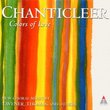| All Artists: Vladimir Horowitz, Scarlatti, Beethoven, Liszt Title: Horowitz in Concert 1967-68 Members Wishing: 0 Total Copies: 1 Label: Sony Release Date: 7/10/1989 Genres: Special Interest, Classical Styles: Marches, Forms & Genres, Sonatas, Historical Periods, Baroque (c.1600-1750), Classical (c.1770-1830), Modern, 20th, & 21st Century, Romantic (c.1820-1910) Number of Discs: 1 SwapaCD Credits: 1 UPC: 074644557220 |
Search - Vladimir Horowitz, Scarlatti, Beethoven :: Horowitz in Concert 1967-68
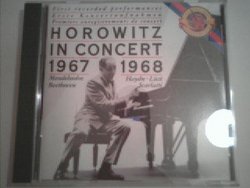 | Vladimir Horowitz, Scarlatti, Beethoven Horowitz in Concert 1967-68 Genres: Special Interest, Classical 9 tracks fro Horowitz's concert tour in 67'-68': D. Scarlatti's Sonata L 35 and L 124; Haydn sonata #58; Beethoven sonata 58; Liszt :scherzo & marsch; Mendelssohn:Etude opus 104b. ![header=[] body=[This CD is available to be requested as disc only.]](/images/attributes/disc.png?v=a4e11020) ![header=[] body=[This CD is available to be requested with the disc and back insert.]](/images/attributes/disc_back.png?v=a4e11020) ![header=[] body=[This CD is available to be requested with the disc and front insert.]](/images/attributes/disc_front.png?v=a4e11020) ![header=[] body=[This CD is available to be requested with the disc, front and back inserts.]](/images/attributes/disc_front_back.png?v=a4e11020) |
Larger Image |
CD DetailsSynopsis
Product Description 9 tracks fro Horowitz's concert tour in 67'-68': D. Scarlatti's Sonata L 35 and L 124; Haydn sonata #58; Beethoven sonata 58; Liszt :scherzo & marsch; Mendelssohn:Etude opus 104b. Similarly Requested CDs
|
CD ReviewsMiddle-period Horowitz Hank Drake | Cleveland, OH United States | 01/14/2010 (5 out of 5 stars) "In 1989, a few months before his death, this "new" Horowitz recording was released with the Maestro's permission. The items on this CD were recorded in concert in 1967-1968 and had never been issued before, and all were new to the Horowitz discography. Since this CDs release, these recording have been reissued several times.
The hallmarks of Horowitz's Scarlatti can be heard in the two Sonatas heard here: perfect transference of Scarlatti's sound world onto the modern piano; infinite grades of detachment and color; careful use of the sustaining pedal; flawless judgment of dynamics--from soft-softer-softest on the lower end, yet never pushing the piano too far into the forte range. Horowitz always seemed at home with Haydn's diverse pianistic textures and musical humor. The pianist plays the opening movement of the C-major Sonata at a much broader tempo than usual, phrasing it as if it were an opera aria. The second movement, one of Haydn's wittiest rondos, runs at a brisk tempo, with the sudden key-shifts and off-beat accents handled with Horowitz's usual aplomb. Horowitz was not congenial to late Beethoven, and felt that the piano works after Op. 81a were not meant for public performance--certainly not for today's mammoth concert halls. The pianist made an exception with the Sonata in A Major, Op. 101, performing it occasionally: in the 1930s, in 1967, 1980, and during his disastrous 1983 tour. This is pianistically one of the finest Op. 101s ever committed to disc (but his concert performances from 1980 were even more polished). For once, Beethoven's murky late piano writing is clear. The first movement sounds almost Wagnerian in its pathos. The dotted rhythms in the march are Schumannesque, the accents nearly brutal--no other performance on this work so clearly demonstrates Beethoven's influence on Schumann. The fugue is played with unprecedented clarity, despite a few quite inconsequential wrong notes--no pianist gets through this fugue unscathed. Apparently, Horowitz only played Liszt's Scherzo and March once, at the concert recorded here. As was customary with some of Liszt's less serious efforts, the pianist made a few alterations to the score, reducing redundant passages, expanding others, and composing a more effective ending--all of which unquestionably improve the piece. Horowitz commits the crime of making this bombastic, vulgar piece sound better than it is, and his brilliant, demonic performance proves my music teachers old witticism on Horowitz: "The worse the piece, the better he plays it." The Mendelssohn Etude is a remarkable display of Horowitz's rapid and even fingerwork, with a coda by the pianist which makes a much more effective ending than Mendelssohn's original. What a pity he never recorded the same composer's Spinning Song. The sound is remarkably consistent despite varying recording locales, and it eminently acceptable." |

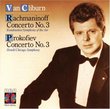
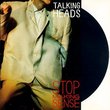

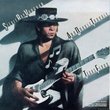
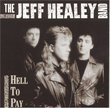


![Waylon Jennings - Greatest Hits [RCA]](https://nationalbookswap.com/cd//m/27/2727/92727.jpg)
